Research Reflection Essay: Illness, Culture, and Social Construct
VerifiedAdded on 2023/04/20
|10
|2272
|165
Essay
AI Summary
This essay delves into the concept of illness as a social construct within the framework of cultural anthropology. It explores how societal perceptions, cultural beliefs, and social norms influence the understanding and experience of diseases. The research examines the initial research question focusing on how society affects people's views on diseases and revises the thesis to reflect anthropological perspectives, emphasizing the critical role of social construction in medical sociology. The essay discusses the relationship between the research topic and anthropology, highlighting how culture shapes preconceived notions about illnesses and impacts healthcare practices. It analyzes relevant research sources, including a key article on the social construction of illness, and considers the views of other anthropologists on the topic. The essay draws preliminary conclusions about the correlation between medical sociology and the social construction of illness, emphasizing the impact of societal attitudes on patients and healthcare policies. It also outlines future directions for research, including the need for primary data collection through surveys and further exploration of policy implications. The research underscores the significance of understanding the negative impacts of social constructs on those afflicted by illnesses and advocates for increased awareness and further research in this field.
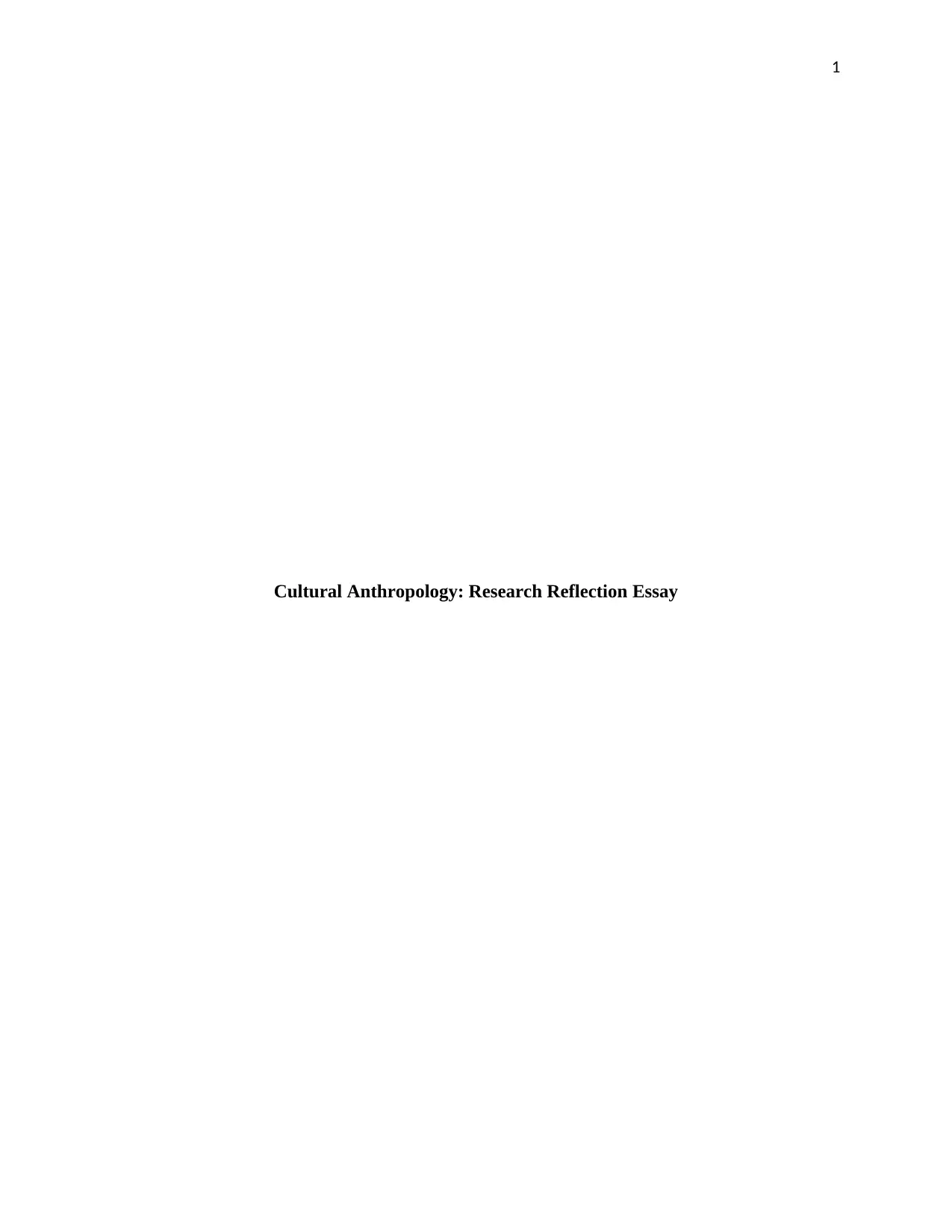
1
Cultural Anthropology: Research Reflection Essay
Cultural Anthropology: Research Reflection Essay
Paraphrase This Document
Need a fresh take? Get an instant paraphrase of this document with our AI Paraphraser
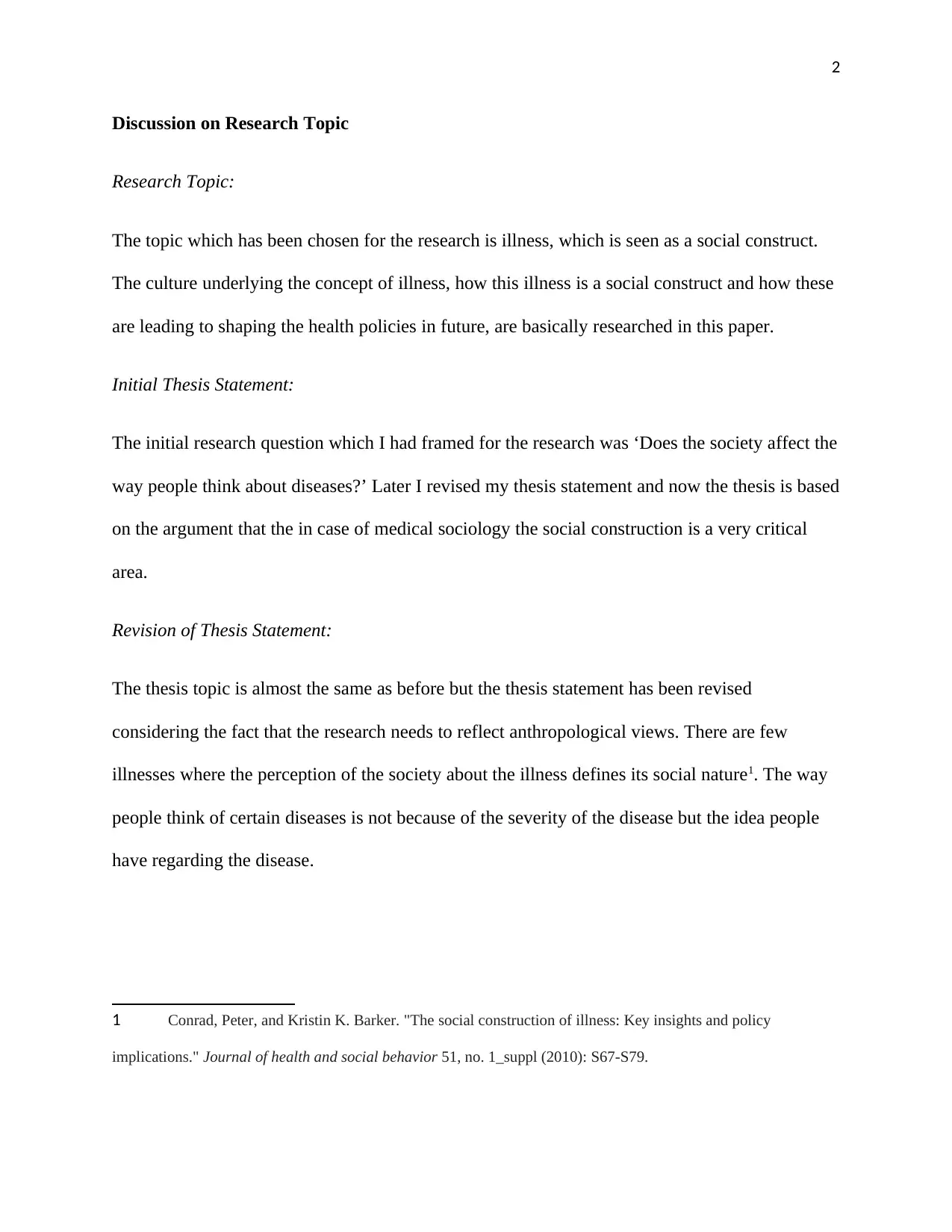
2
Discussion on Research Topic
Research Topic:
The topic which has been chosen for the research is illness, which is seen as a social construct.
The culture underlying the concept of illness, how this illness is a social construct and how these
are leading to shaping the health policies in future, are basically researched in this paper.
Initial Thesis Statement:
The initial research question which I had framed for the research was ‘Does the society affect the
way people think about diseases?’ Later I revised my thesis statement and now the thesis is based
on the argument that the in case of medical sociology the social construction is a very critical
area.
Revision of Thesis Statement:
The thesis topic is almost the same as before but the thesis statement has been revised
considering the fact that the research needs to reflect anthropological views. There are few
illnesses where the perception of the society about the illness defines its social nature1. The way
people think of certain diseases is not because of the severity of the disease but the idea people
have regarding the disease.
1 Conrad, Peter, and Kristin K. Barker. "The social construction of illness: Key insights and policy
implications." Journal of health and social behavior 51, no. 1_suppl (2010): S67-S79.
Discussion on Research Topic
Research Topic:
The topic which has been chosen for the research is illness, which is seen as a social construct.
The culture underlying the concept of illness, how this illness is a social construct and how these
are leading to shaping the health policies in future, are basically researched in this paper.
Initial Thesis Statement:
The initial research question which I had framed for the research was ‘Does the society affect the
way people think about diseases?’ Later I revised my thesis statement and now the thesis is based
on the argument that the in case of medical sociology the social construction is a very critical
area.
Revision of Thesis Statement:
The thesis topic is almost the same as before but the thesis statement has been revised
considering the fact that the research needs to reflect anthropological views. There are few
illnesses where the perception of the society about the illness defines its social nature1. The way
people think of certain diseases is not because of the severity of the disease but the idea people
have regarding the disease.
1 Conrad, Peter, and Kristin K. Barker. "The social construction of illness: Key insights and policy
implications." Journal of health and social behavior 51, no. 1_suppl (2010): S67-S79.
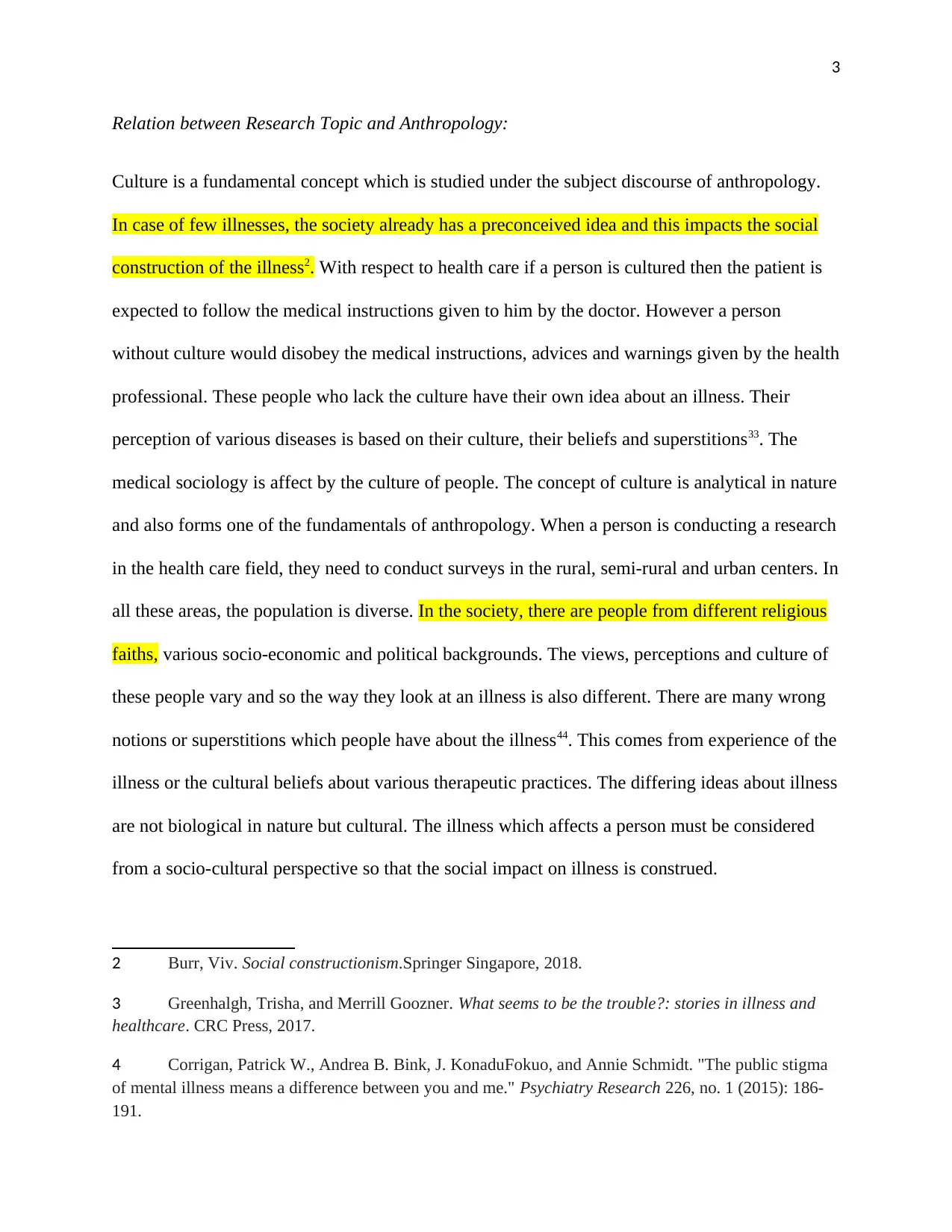
3
Relation between Research Topic and Anthropology:
Culture is a fundamental concept which is studied under the subject discourse of anthropology.
In case of few illnesses, the society already has a preconceived idea and this impacts the social
construction of the illness2. With respect to health care if a person is cultured then the patient is
expected to follow the medical instructions given to him by the doctor. However a person
without culture would disobey the medical instructions, advices and warnings given by the health
professional. These people who lack the culture have their own idea about an illness. Their
perception of various diseases is based on their culture, their beliefs and superstitions33. The
medical sociology is affect by the culture of people. The concept of culture is analytical in nature
and also forms one of the fundamentals of anthropology. When a person is conducting a research
in the health care field, they need to conduct surveys in the rural, semi-rural and urban centers. In
all these areas, the population is diverse. In the society, there are people from different religious
faiths, various socio-economic and political backgrounds. The views, perceptions and culture of
these people vary and so the way they look at an illness is also different. There are many wrong
notions or superstitions which people have about the illness44. This comes from experience of the
illness or the cultural beliefs about various therapeutic practices. The differing ideas about illness
are not biological in nature but cultural. The illness which affects a person must be considered
from a socio-cultural perspective so that the social impact on illness is construed.
2 Burr, Viv. Social constructionism.Springer Singapore, 2018.
3 Greenhalgh, Trisha, and Merrill Goozner. What seems to be the trouble?: stories in illness and
healthcare. CRC Press, 2017.
4 Corrigan, Patrick W., Andrea B. Bink, J. KonaduFokuo, and Annie Schmidt. "The public stigma
of mental illness means a difference between you and me." Psychiatry Research 226, no. 1 (2015): 186-
191.
Relation between Research Topic and Anthropology:
Culture is a fundamental concept which is studied under the subject discourse of anthropology.
In case of few illnesses, the society already has a preconceived idea and this impacts the social
construction of the illness2. With respect to health care if a person is cultured then the patient is
expected to follow the medical instructions given to him by the doctor. However a person
without culture would disobey the medical instructions, advices and warnings given by the health
professional. These people who lack the culture have their own idea about an illness. Their
perception of various diseases is based on their culture, their beliefs and superstitions33. The
medical sociology is affect by the culture of people. The concept of culture is analytical in nature
and also forms one of the fundamentals of anthropology. When a person is conducting a research
in the health care field, they need to conduct surveys in the rural, semi-rural and urban centers. In
all these areas, the population is diverse. In the society, there are people from different religious
faiths, various socio-economic and political backgrounds. The views, perceptions and culture of
these people vary and so the way they look at an illness is also different. There are many wrong
notions or superstitions which people have about the illness44. This comes from experience of the
illness or the cultural beliefs about various therapeutic practices. The differing ideas about illness
are not biological in nature but cultural. The illness which affects a person must be considered
from a socio-cultural perspective so that the social impact on illness is construed.
2 Burr, Viv. Social constructionism.Springer Singapore, 2018.
3 Greenhalgh, Trisha, and Merrill Goozner. What seems to be the trouble?: stories in illness and
healthcare. CRC Press, 2017.
4 Corrigan, Patrick W., Andrea B. Bink, J. KonaduFokuo, and Annie Schmidt. "The public stigma
of mental illness means a difference between you and me." Psychiatry Research 226, no. 1 (2015): 186-
191.
⊘ This is a preview!⊘
Do you want full access?
Subscribe today to unlock all pages.

Trusted by 1+ million students worldwide
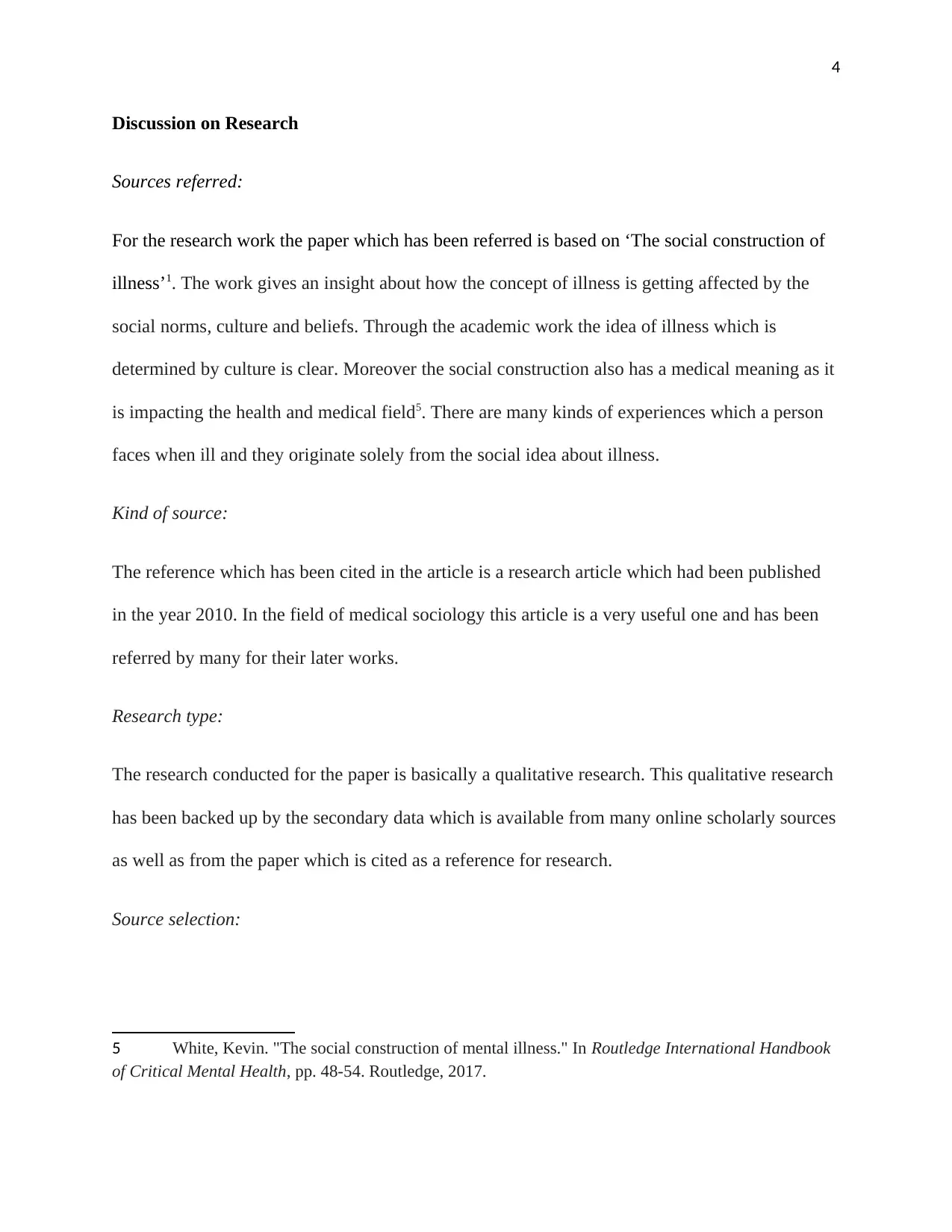
4
Discussion on Research
Sources referred:
For the research work the paper which has been referred is based on ‘The social construction of
illness’1. The work gives an insight about how the concept of illness is getting affected by the
social norms, culture and beliefs. Through the academic work the idea of illness which is
determined by culture is clear. Moreover the social construction also has a medical meaning as it
is impacting the health and medical field5. There are many kinds of experiences which a person
faces when ill and they originate solely from the social idea about illness.
Kind of source:
The reference which has been cited in the article is a research article which had been published
in the year 2010. In the field of medical sociology this article is a very useful one and has been
referred by many for their later works.
Research type:
The research conducted for the paper is basically a qualitative research. This qualitative research
has been backed up by the secondary data which is available from many online scholarly sources
as well as from the paper which is cited as a reference for research.
Source selection:
5 White, Kevin. "The social construction of mental illness." In Routledge International Handbook
of Critical Mental Health, pp. 48-54. Routledge, 2017.
Discussion on Research
Sources referred:
For the research work the paper which has been referred is based on ‘The social construction of
illness’1. The work gives an insight about how the concept of illness is getting affected by the
social norms, culture and beliefs. Through the academic work the idea of illness which is
determined by culture is clear. Moreover the social construction also has a medical meaning as it
is impacting the health and medical field5. There are many kinds of experiences which a person
faces when ill and they originate solely from the social idea about illness.
Kind of source:
The reference which has been cited in the article is a research article which had been published
in the year 2010. In the field of medical sociology this article is a very useful one and has been
referred by many for their later works.
Research type:
The research conducted for the paper is basically a qualitative research. This qualitative research
has been backed up by the secondary data which is available from many online scholarly sources
as well as from the paper which is cited as a reference for research.
Source selection:
5 White, Kevin. "The social construction of mental illness." In Routledge International Handbook
of Critical Mental Health, pp. 48-54. Routledge, 2017.
Paraphrase This Document
Need a fresh take? Get an instant paraphrase of this document with our AI Paraphraser
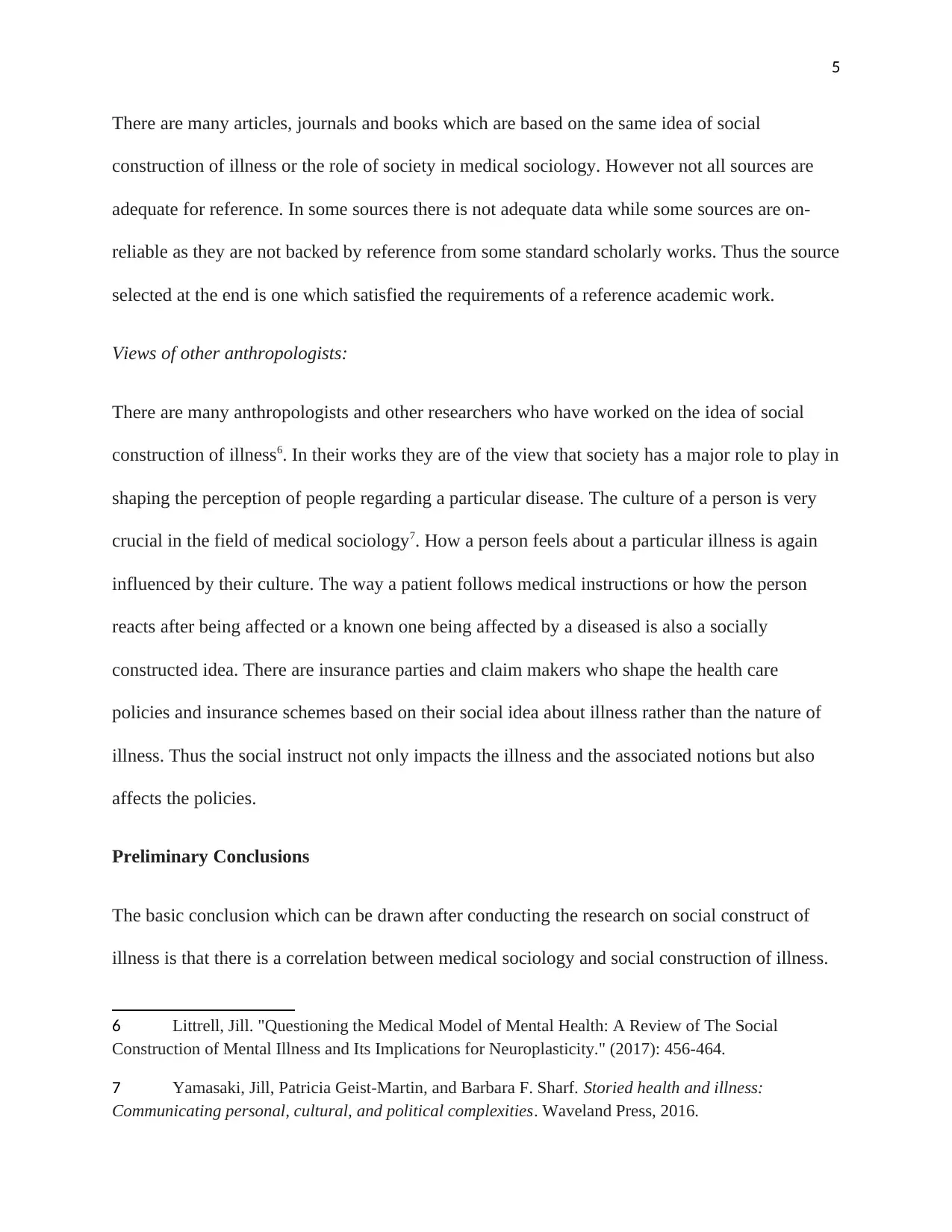
5
There are many articles, journals and books which are based on the same idea of social
construction of illness or the role of society in medical sociology. However not all sources are
adequate for reference. In some sources there is not adequate data while some sources are on-
reliable as they are not backed by reference from some standard scholarly works. Thus the source
selected at the end is one which satisfied the requirements of a reference academic work.
Views of other anthropologists:
There are many anthropologists and other researchers who have worked on the idea of social
construction of illness6. In their works they are of the view that society has a major role to play in
shaping the perception of people regarding a particular disease. The culture of a person is very
crucial in the field of medical sociology7. How a person feels about a particular illness is again
influenced by their culture. The way a patient follows medical instructions or how the person
reacts after being affected or a known one being affected by a diseased is also a socially
constructed idea. There are insurance parties and claim makers who shape the health care
policies and insurance schemes based on their social idea about illness rather than the nature of
illness. Thus the social instruct not only impacts the illness and the associated notions but also
affects the policies.
Preliminary Conclusions
The basic conclusion which can be drawn after conducting the research on social construct of
illness is that there is a correlation between medical sociology and social construction of illness.
6 Littrell, Jill. "Questioning the Medical Model of Mental Health: A Review of The Social
Construction of Mental Illness and Its Implications for Neuroplasticity." (2017): 456-464.
7 Yamasaki, Jill, Patricia Geist-Martin, and Barbara F. Sharf. Storied health and illness:
Communicating personal, cultural, and political complexities. Waveland Press, 2016.
There are many articles, journals and books which are based on the same idea of social
construction of illness or the role of society in medical sociology. However not all sources are
adequate for reference. In some sources there is not adequate data while some sources are on-
reliable as they are not backed by reference from some standard scholarly works. Thus the source
selected at the end is one which satisfied the requirements of a reference academic work.
Views of other anthropologists:
There are many anthropologists and other researchers who have worked on the idea of social
construction of illness6. In their works they are of the view that society has a major role to play in
shaping the perception of people regarding a particular disease. The culture of a person is very
crucial in the field of medical sociology7. How a person feels about a particular illness is again
influenced by their culture. The way a patient follows medical instructions or how the person
reacts after being affected or a known one being affected by a diseased is also a socially
constructed idea. There are insurance parties and claim makers who shape the health care
policies and insurance schemes based on their social idea about illness rather than the nature of
illness. Thus the social instruct not only impacts the illness and the associated notions but also
affects the policies.
Preliminary Conclusions
The basic conclusion which can be drawn after conducting the research on social construct of
illness is that there is a correlation between medical sociology and social construction of illness.
6 Littrell, Jill. "Questioning the Medical Model of Mental Health: A Review of The Social
Construction of Mental Illness and Its Implications for Neuroplasticity." (2017): 456-464.
7 Yamasaki, Jill, Patricia Geist-Martin, and Barbara F. Sharf. Storied health and illness:
Communicating personal, cultural, and political complexities. Waveland Press, 2016.
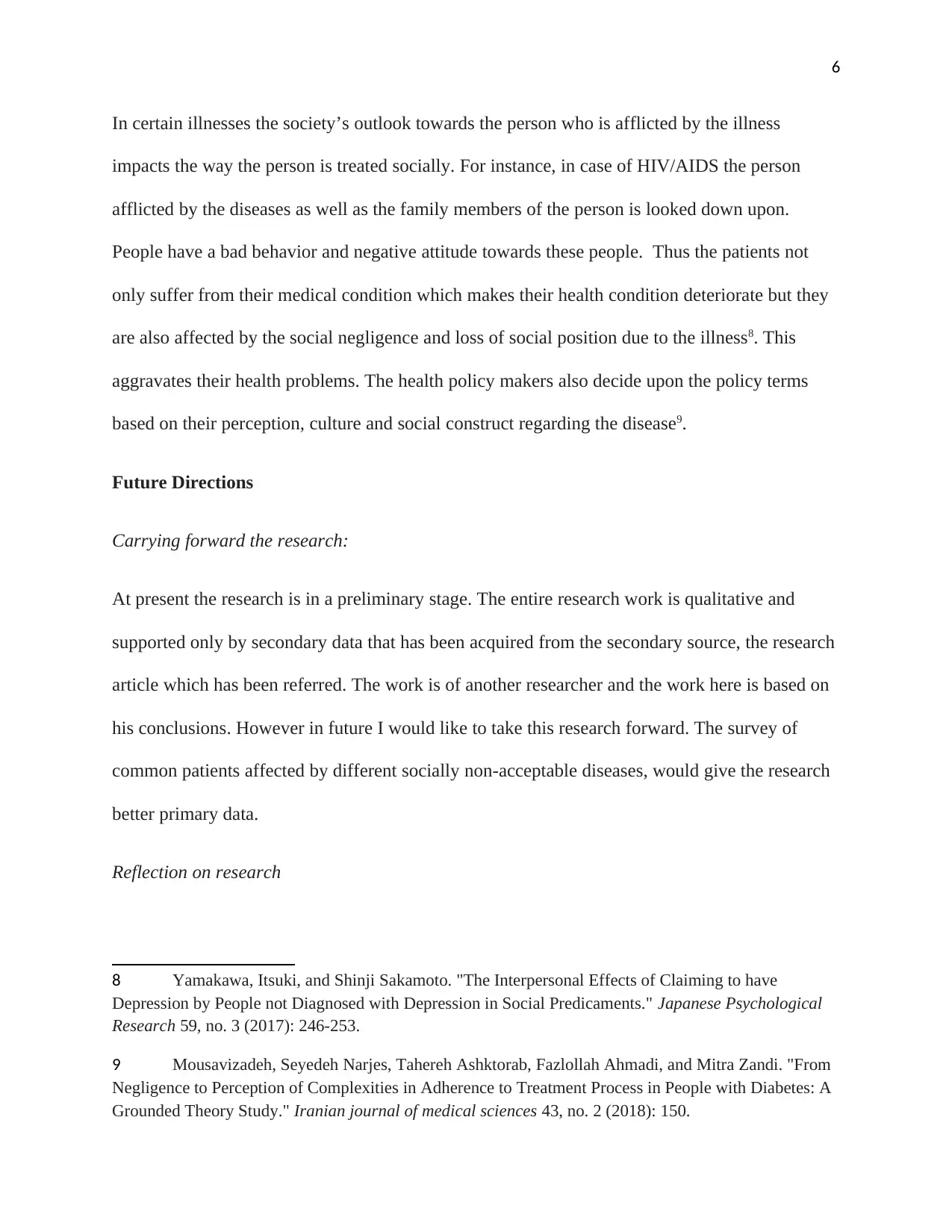
6
In certain illnesses the society’s outlook towards the person who is afflicted by the illness
impacts the way the person is treated socially. For instance, in case of HIV/AIDS the person
afflicted by the diseases as well as the family members of the person is looked down upon.
People have a bad behavior and negative attitude towards these people. Thus the patients not
only suffer from their medical condition which makes their health condition deteriorate but they
are also affected by the social negligence and loss of social position due to the illness8. This
aggravates their health problems. The health policy makers also decide upon the policy terms
based on their perception, culture and social construct regarding the disease9.
Future Directions
Carrying forward the research:
At present the research is in a preliminary stage. The entire research work is qualitative and
supported only by secondary data that has been acquired from the secondary source, the research
article which has been referred. The work is of another researcher and the work here is based on
his conclusions. However in future I would like to take this research forward. The survey of
common patients affected by different socially non-acceptable diseases, would give the research
better primary data.
Reflection on research
8 Yamakawa, Itsuki, and Shinji Sakamoto. "The Interpersonal Effects of Claiming to have
Depression by People not Diagnosed with Depression in Social Predicaments." Japanese Psychological
Research 59, no. 3 (2017): 246-253.
9 Mousavizadeh, Seyedeh Narjes, Tahereh Ashktorab, Fazlollah Ahmadi, and Mitra Zandi. "From
Negligence to Perception of Complexities in Adherence to Treatment Process in People with Diabetes: A
Grounded Theory Study." Iranian journal of medical sciences 43, no. 2 (2018): 150.
In certain illnesses the society’s outlook towards the person who is afflicted by the illness
impacts the way the person is treated socially. For instance, in case of HIV/AIDS the person
afflicted by the diseases as well as the family members of the person is looked down upon.
People have a bad behavior and negative attitude towards these people. Thus the patients not
only suffer from their medical condition which makes their health condition deteriorate but they
are also affected by the social negligence and loss of social position due to the illness8. This
aggravates their health problems. The health policy makers also decide upon the policy terms
based on their perception, culture and social construct regarding the disease9.
Future Directions
Carrying forward the research:
At present the research is in a preliminary stage. The entire research work is qualitative and
supported only by secondary data that has been acquired from the secondary source, the research
article which has been referred. The work is of another researcher and the work here is based on
his conclusions. However in future I would like to take this research forward. The survey of
common patients affected by different socially non-acceptable diseases, would give the research
better primary data.
Reflection on research
8 Yamakawa, Itsuki, and Shinji Sakamoto. "The Interpersonal Effects of Claiming to have
Depression by People not Diagnosed with Depression in Social Predicaments." Japanese Psychological
Research 59, no. 3 (2017): 246-253.
9 Mousavizadeh, Seyedeh Narjes, Tahereh Ashktorab, Fazlollah Ahmadi, and Mitra Zandi. "From
Negligence to Perception of Complexities in Adherence to Treatment Process in People with Diabetes: A
Grounded Theory Study." Iranian journal of medical sciences 43, no. 2 (2018): 150.
⊘ This is a preview!⊘
Do you want full access?
Subscribe today to unlock all pages.

Trusted by 1+ million students worldwide
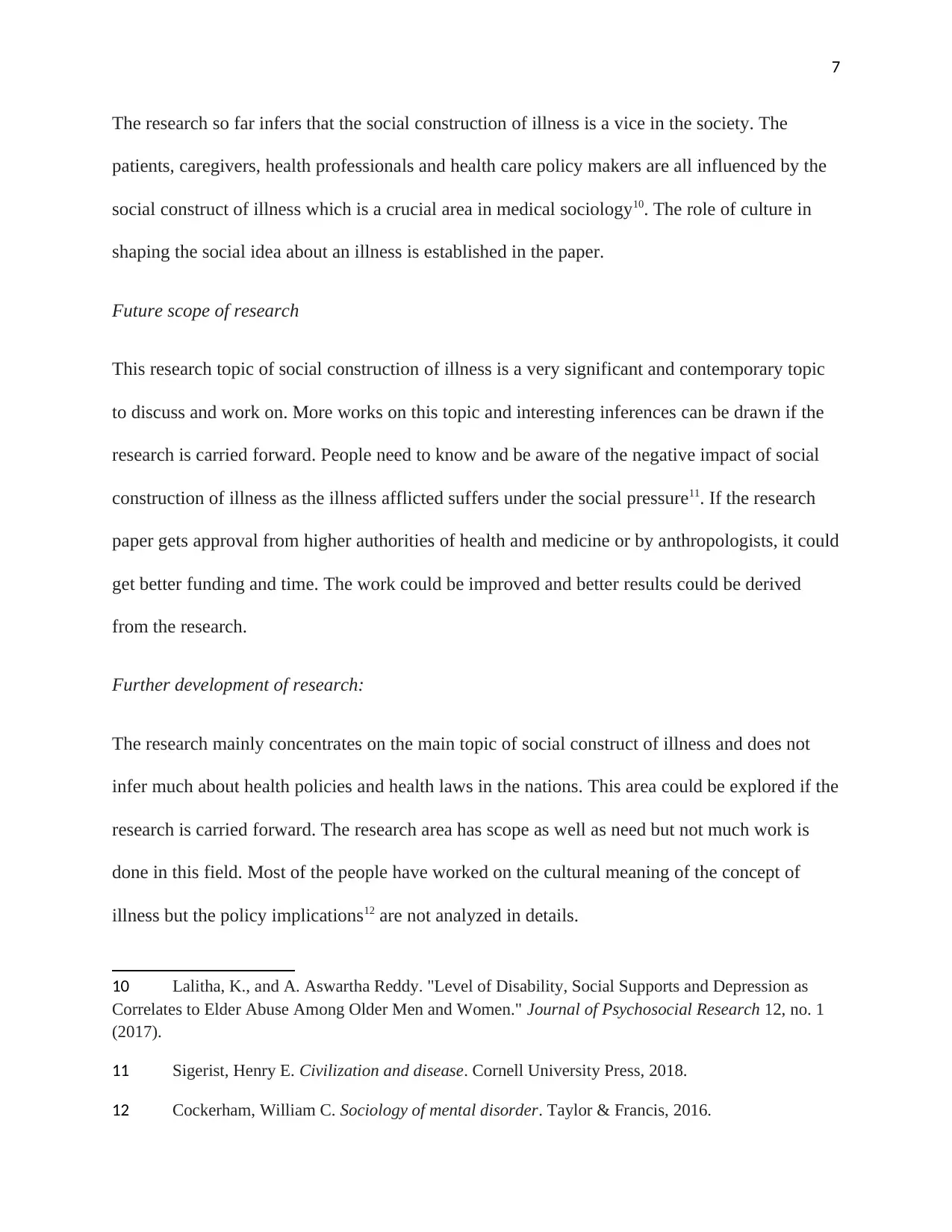
7
The research so far infers that the social construction of illness is a vice in the society. The
patients, caregivers, health professionals and health care policy makers are all influenced by the
social construct of illness which is a crucial area in medical sociology10. The role of culture in
shaping the social idea about an illness is established in the paper.
Future scope of research
This research topic of social construction of illness is a very significant and contemporary topic
to discuss and work on. More works on this topic and interesting inferences can be drawn if the
research is carried forward. People need to know and be aware of the negative impact of social
construction of illness as the illness afflicted suffers under the social pressure11. If the research
paper gets approval from higher authorities of health and medicine or by anthropologists, it could
get better funding and time. The work could be improved and better results could be derived
from the research.
Further development of research:
The research mainly concentrates on the main topic of social construct of illness and does not
infer much about health policies and health laws in the nations. This area could be explored if the
research is carried forward. The research area has scope as well as need but not much work is
done in this field. Most of the people have worked on the cultural meaning of the concept of
illness but the policy implications12 are not analyzed in details.
10 Lalitha, K., and A. Aswartha Reddy. "Level of Disability, Social Supports and Depression as
Correlates to Elder Abuse Among Older Men and Women." Journal of Psychosocial Research 12, no. 1
(2017).
11 Sigerist, Henry E. Civilization and disease. Cornell University Press, 2018.
12 Cockerham, William C. Sociology of mental disorder. Taylor & Francis, 2016.
The research so far infers that the social construction of illness is a vice in the society. The
patients, caregivers, health professionals and health care policy makers are all influenced by the
social construct of illness which is a crucial area in medical sociology10. The role of culture in
shaping the social idea about an illness is established in the paper.
Future scope of research
This research topic of social construction of illness is a very significant and contemporary topic
to discuss and work on. More works on this topic and interesting inferences can be drawn if the
research is carried forward. People need to know and be aware of the negative impact of social
construction of illness as the illness afflicted suffers under the social pressure11. If the research
paper gets approval from higher authorities of health and medicine or by anthropologists, it could
get better funding and time. The work could be improved and better results could be derived
from the research.
Further development of research:
The research mainly concentrates on the main topic of social construct of illness and does not
infer much about health policies and health laws in the nations. This area could be explored if the
research is carried forward. The research area has scope as well as need but not much work is
done in this field. Most of the people have worked on the cultural meaning of the concept of
illness but the policy implications12 are not analyzed in details.
10 Lalitha, K., and A. Aswartha Reddy. "Level of Disability, Social Supports and Depression as
Correlates to Elder Abuse Among Older Men and Women." Journal of Psychosocial Research 12, no. 1
(2017).
11 Sigerist, Henry E. Civilization and disease. Cornell University Press, 2018.
12 Cockerham, William C. Sociology of mental disorder. Taylor & Francis, 2016.
Paraphrase This Document
Need a fresh take? Get an instant paraphrase of this document with our AI Paraphraser

8
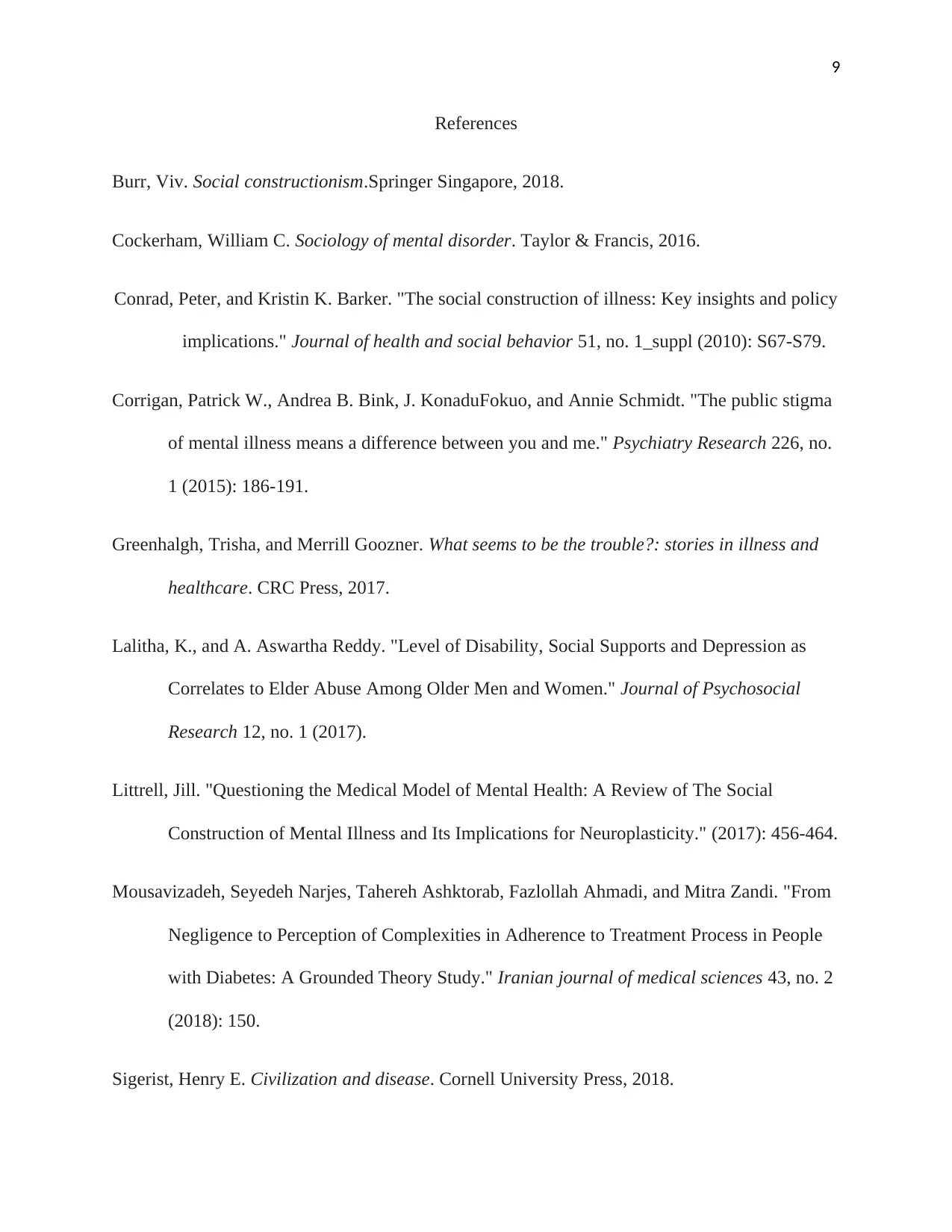
9
References
Burr, Viv. Social constructionism.Springer Singapore, 2018.
Cockerham, William C. Sociology of mental disorder. Taylor & Francis, 2016.
Conrad, Peter, and Kristin K. Barker. "The social construction of illness: Key insights and policy
implications." Journal of health and social behavior 51, no. 1_suppl (2010): S67-S79.
Corrigan, Patrick W., Andrea B. Bink, J. KonaduFokuo, and Annie Schmidt. "The public stigma
of mental illness means a difference between you and me." Psychiatry Research 226, no.
1 (2015): 186-191.
Greenhalgh, Trisha, and Merrill Goozner. What seems to be the trouble?: stories in illness and
healthcare. CRC Press, 2017.
Lalitha, K., and A. Aswartha Reddy. "Level of Disability, Social Supports and Depression as
Correlates to Elder Abuse Among Older Men and Women." Journal of Psychosocial
Research 12, no. 1 (2017).
Littrell, Jill. "Questioning the Medical Model of Mental Health: A Review of The Social
Construction of Mental Illness and Its Implications for Neuroplasticity." (2017): 456-464.
Mousavizadeh, Seyedeh Narjes, Tahereh Ashktorab, Fazlollah Ahmadi, and Mitra Zandi. "From
Negligence to Perception of Complexities in Adherence to Treatment Process in People
with Diabetes: A Grounded Theory Study." Iranian journal of medical sciences 43, no. 2
(2018): 150.
Sigerist, Henry E. Civilization and disease. Cornell University Press, 2018.
References
Burr, Viv. Social constructionism.Springer Singapore, 2018.
Cockerham, William C. Sociology of mental disorder. Taylor & Francis, 2016.
Conrad, Peter, and Kristin K. Barker. "The social construction of illness: Key insights and policy
implications." Journal of health and social behavior 51, no. 1_suppl (2010): S67-S79.
Corrigan, Patrick W., Andrea B. Bink, J. KonaduFokuo, and Annie Schmidt. "The public stigma
of mental illness means a difference between you and me." Psychiatry Research 226, no.
1 (2015): 186-191.
Greenhalgh, Trisha, and Merrill Goozner. What seems to be the trouble?: stories in illness and
healthcare. CRC Press, 2017.
Lalitha, K., and A. Aswartha Reddy. "Level of Disability, Social Supports and Depression as
Correlates to Elder Abuse Among Older Men and Women." Journal of Psychosocial
Research 12, no. 1 (2017).
Littrell, Jill. "Questioning the Medical Model of Mental Health: A Review of The Social
Construction of Mental Illness and Its Implications for Neuroplasticity." (2017): 456-464.
Mousavizadeh, Seyedeh Narjes, Tahereh Ashktorab, Fazlollah Ahmadi, and Mitra Zandi. "From
Negligence to Perception of Complexities in Adherence to Treatment Process in People
with Diabetes: A Grounded Theory Study." Iranian journal of medical sciences 43, no. 2
(2018): 150.
Sigerist, Henry E. Civilization and disease. Cornell University Press, 2018.
⊘ This is a preview!⊘
Do you want full access?
Subscribe today to unlock all pages.

Trusted by 1+ million students worldwide
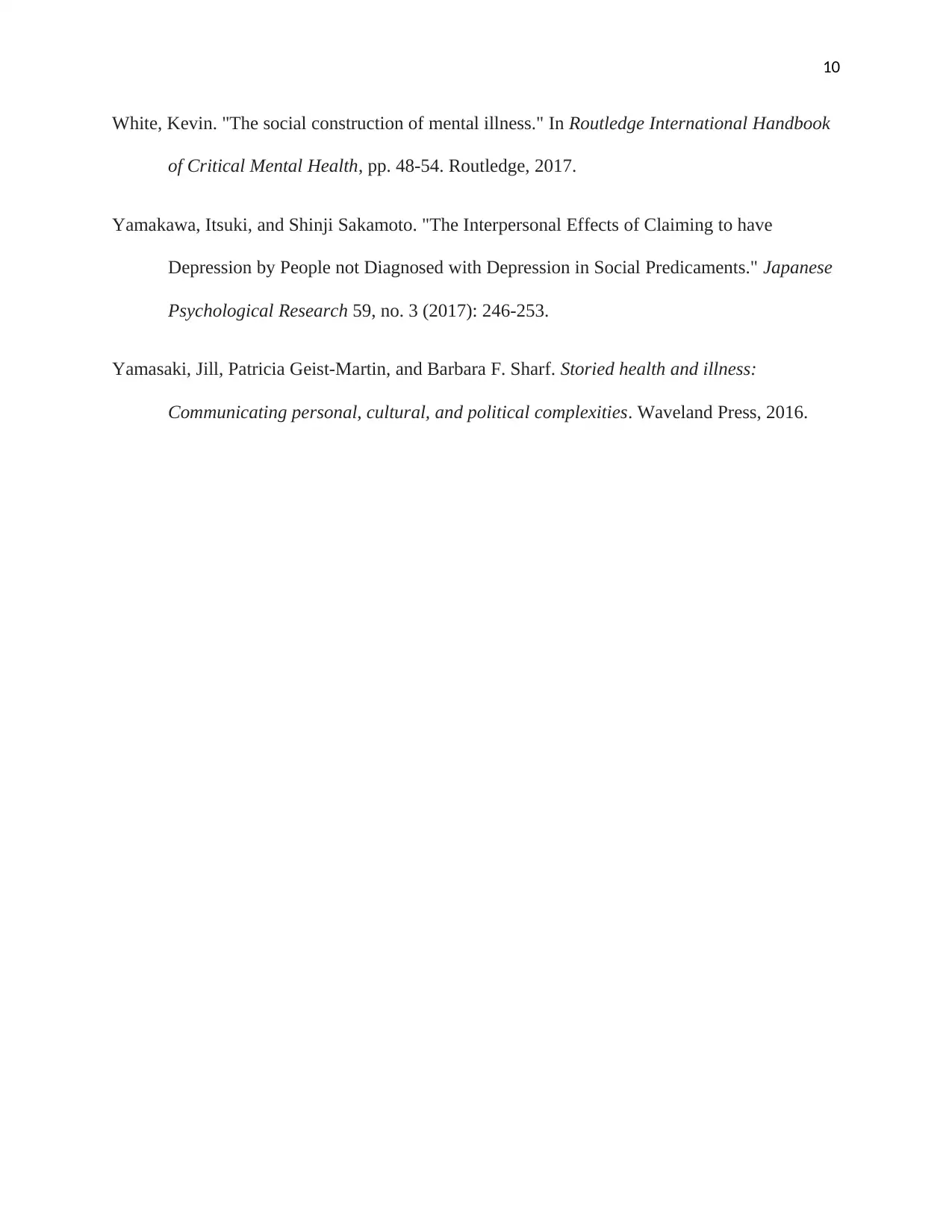
10
White, Kevin. "The social construction of mental illness." In Routledge International Handbook
of Critical Mental Health, pp. 48-54. Routledge, 2017.
Yamakawa, Itsuki, and Shinji Sakamoto. "The Interpersonal Effects of Claiming to have
Depression by People not Diagnosed with Depression in Social Predicaments." Japanese
Psychological Research 59, no. 3 (2017): 246-253.
Yamasaki, Jill, Patricia Geist-Martin, and Barbara F. Sharf. Storied health and illness:
Communicating personal, cultural, and political complexities. Waveland Press, 2016.
White, Kevin. "The social construction of mental illness." In Routledge International Handbook
of Critical Mental Health, pp. 48-54. Routledge, 2017.
Yamakawa, Itsuki, and Shinji Sakamoto. "The Interpersonal Effects of Claiming to have
Depression by People not Diagnosed with Depression in Social Predicaments." Japanese
Psychological Research 59, no. 3 (2017): 246-253.
Yamasaki, Jill, Patricia Geist-Martin, and Barbara F. Sharf. Storied health and illness:
Communicating personal, cultural, and political complexities. Waveland Press, 2016.
1 out of 10
Related Documents
Your All-in-One AI-Powered Toolkit for Academic Success.
+13062052269
info@desklib.com
Available 24*7 on WhatsApp / Email
![[object Object]](/_next/static/media/star-bottom.7253800d.svg)
Unlock your academic potential
Copyright © 2020–2026 A2Z Services. All Rights Reserved. Developed and managed by ZUCOL.





